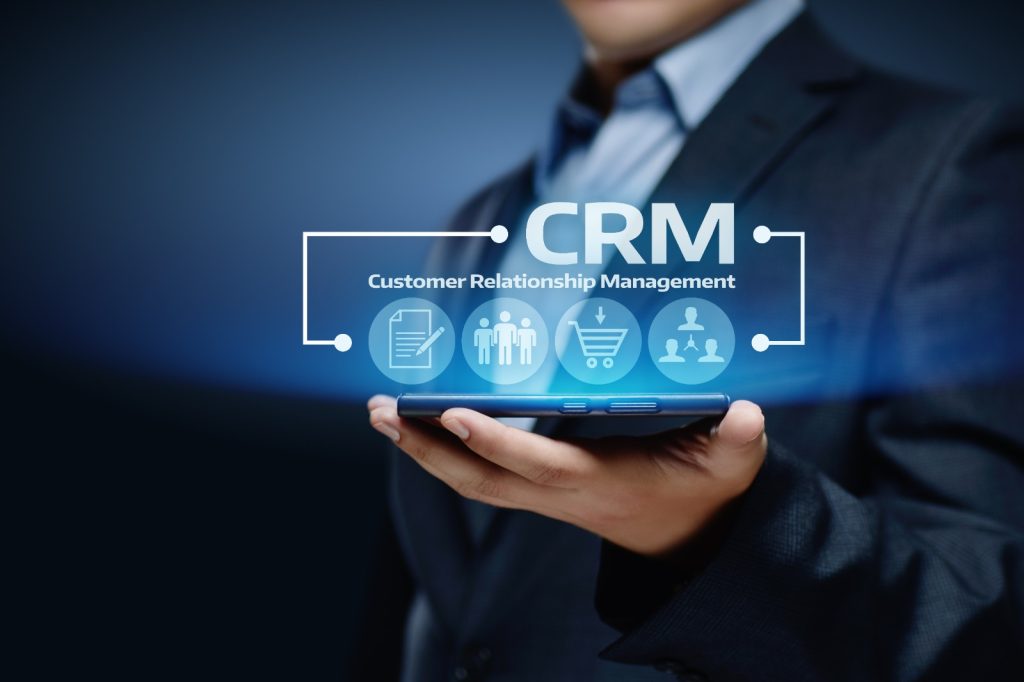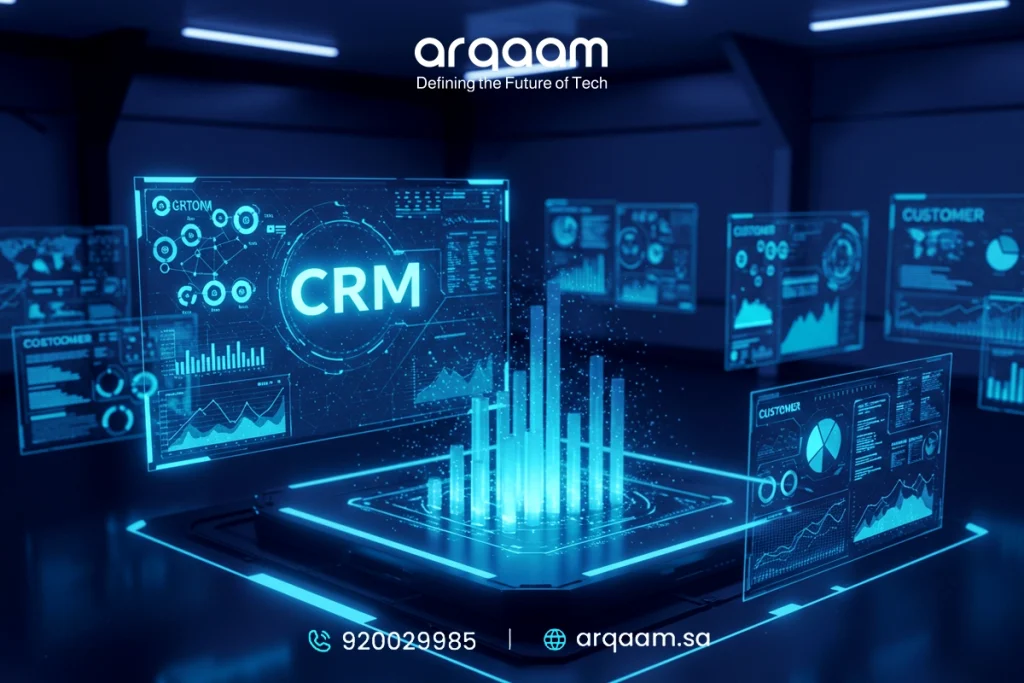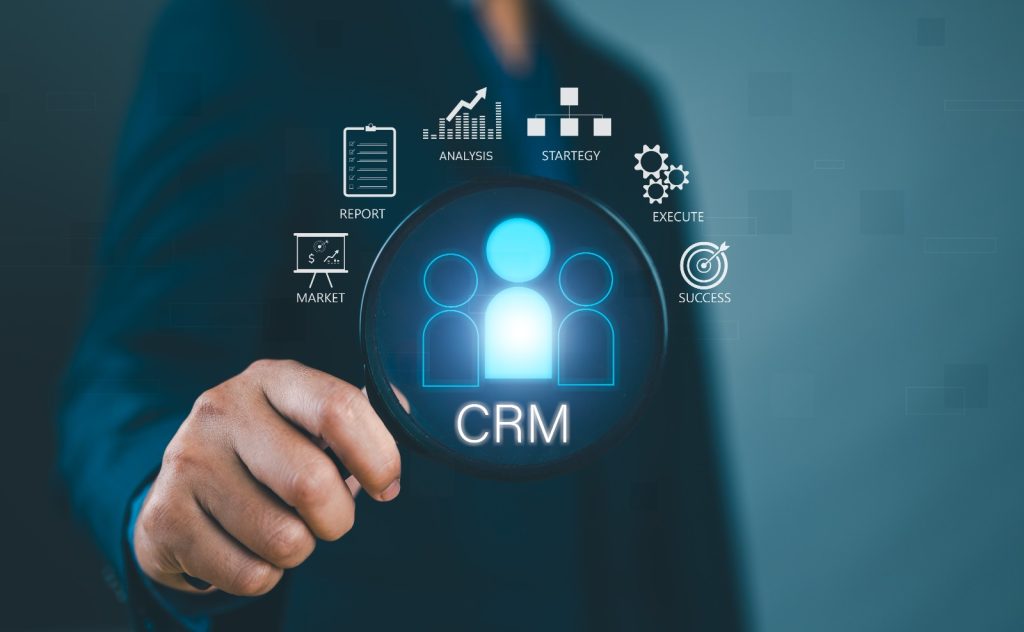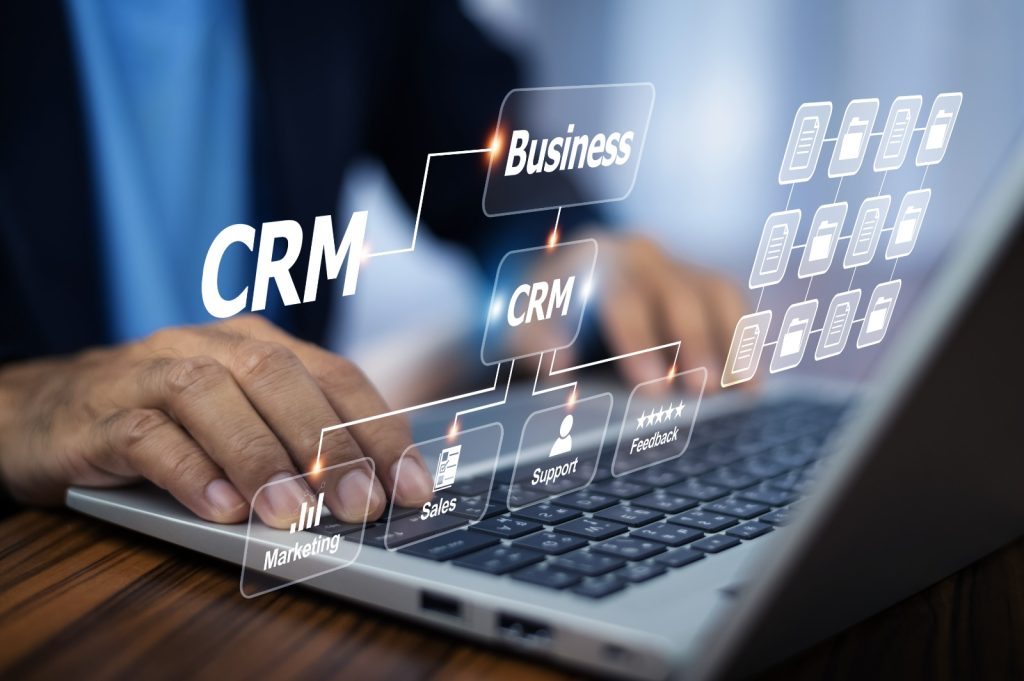Cloud Call Center Integration with Customer Relationship Management (CRM) Systems

نوفمبر 5, 2024 Uncategorized Cloud Call Center Integration with Customer Relationship Management (CRM) Systems Cloud Call Center Integration with CRM Systems (Customer Relationship Management) There is often confusion between the Call Center System and the Customer Relationship Management (CRM) System, as each plays a distinct role in supporting a company’s internal operations. Some businesses heavily rely on a Call Center System to communicate with customers anytime and anywhere. In contrast, others depend on the intelligent capabilities of CRM systems to enhance customer relationship management, understand customer needs, and resolve issues. In some cases, companies may need to utilize both systems together to achieve better integration in communication and customer service operations. Regardless of the company’s size or the services it offers—whether it’s a small startup or a large enterprise—modern communication systems have become essential for continuous and efficient engagement with all types of customers, whether they are potential, existing, or loyal clients. These systems not only assist in problem-solving but also help in meeting customer needs, enhancing satisfaction and fostering brand loyalty. What is the difference between a Call Center System and a CRM System? What is a Call Center System? A Call Center System is a technical platform used to manage and coordinate communication processes within companies. It connects customers with support or sales teams via phone calls. This system aims to improve the company’s communication with its customers by efficiently handling inquiries, complaints, or requests. Components of a Call Center System: Communication Lines: Allow for receiving customer calls, whether local or international. Call Management Software: Automatically routes calls to the appropriate department or agent. Call Recording: Enables call recording for future review or to improve service quality. Performance Reports: Provides insights into call volume, wait times, and customer satisfaction levels. Integration with Other Systems: Can be integrated with CRM systems to track all customer interactions and enhance their experience. Benefits of a Call Center System: Enhanced Customer Service: Facilitates quick resolution of customer issues and inquiries. Increased Productivity: Automates call routing, reducing downtime and maximizing efficiency. Scalability: Can handle a large volume of calls without compromising service quality. Multi-channel Support: In addition to phone calls, the system can support other communication channels like email and live chat. What is a CRM System? A Customer Relationship Management (CRM) System is a technology solution that helps companies manage and organize their interactions with current and potential customers. The system is designed to enhance customer relationships and improve the customer experience by providing comprehensive information, enabling companies to meet customer needs more efficiently and effectively. Components of a CRM System: Data Management: Enables businesses to gather and store all customer-related information, including personal data, purchase history, preferences, and interaction records. Process Automation: Automates routine tasks such as sending marketing emails, scheduling appointments, and continuously following up with customers. Customer Analytics: Provides accurate reports on marketing campaign performance and customer behavior, helping businesses refine their strategies. Integration with Other Systems: Can be integrated with email systems, call centers, and sales tools, allowing businesses to track all customer interactions in one place. Benefits of a CRM System: Improved Customer Experience: Tracks and understands customer needs, providing personalized services that meet their expectations. Increased Customer Loyalty: Offers a comprehensive view of the customer’s history and interactions, enabling better service and loyalty strategies. Enhanced Sales: Helps track sales opportunities and provides data-driven recommendations based on customer behavior and purchasing patterns. Automated Marketing: Supports marketing efforts by sending targeted messages to the right audience based on the data collected by the system. Time and Effort Savings: Reduces manual work and streamlines customer relationship management by automating processes and integrating with other systems. Difference Between Call Center Systems and CRM Systems: Call Center System: Purpose: Used to facilitate telephone-based communication between the company and its customers. Primary Function: Manages incoming and outgoing calls, routes them to the appropriate departments, and records them for review and analysis. Usage: Primarily aims to provide a quick communication channel with current or potential customers, especially in support, customer service, or sales departments. Focus: Focuses on real-time communication and immediate problem resolution through phone calls. Technologies: May include tools like automatic call routing (IVR), call recording, and performance analytics for contact centers. CRM System: Purpose: Used to manage all aspects of the customer relationship across all channels. Primary Function: Tracks customer information such as contact details, purchase history, previous interactions, and business opportunities. It allows companies to have a comprehensive view of the customer journey and analyze their preferences and behavior. Usage: Used to manage long-term customer engagement, including sales, marketing, and post-sale support. Focus: Focuses on building sustainable relationships with customers by offering personalized solutions based on available data to enhance the customer experience and increase loyalty. Technologies: Includes technologies for data analysis, marketing automation, and managing interactions across multiple channels such as email, phone calls, and social media. Integration Between Call Center and CRM Systems: The integration between a Call Center System and a CRM offers an optimal solution for improving the customer experience and enhancing internal operational efficiency. This integration allows companies to leverage the benefits of both systems and deliver high-quality services to their clients. Here’s how the integration works and the benefits it brings: Unified Information in One Place: How It Works: When the Call Center System is integrated with CRM, all phone calls are linked to the customer database in the CRM. This enables call center agents to instantly access customer information such as call history, previous requests, preferences, and resolved issues. Benefit: Streamlined access to information makes it easier to provide personalized and fast service without needing to ask the customer for details repeatedly. Better Customer Journey Tracking: How It Works: By merging the data collected in the Call Center with CRM, companies can fully track the customer’s journey. Every phone call or interaction is added to the customer’s comprehensive record in CRM. Benefit: This integration gives teams a complete view of the customer’s interactions, helping to provide more personalized experiences and predict future
Deep data Analysis in CRM Systems | Full Guide

Deep data Analysis in CRM Systems | Full Guide November 5, 2024 crm Do you want to perform CRM data analysis on your customer data to make informed decisions about how to interact with them, win each customer, and turn them into real opportunities? Great thinking! But how about setting aside old methods and learning a new way? If you’re interested, keep reading the article so I can tell you how to analyze customer data accurately and in-depth using a CRM system. Deep CRM Data Analysis for Customers: Transforming the Future of Business Are you looking to maximize your return on marketing investment? The ideal starting point is Customer Relationship Management (CRM). According to a study, about 91% of businesses rely on CRM systems. The Importance of Customer Data Analysis Before I teach you the method, you need to understand why analyzing customer data is important. This will help you use the method effectively. Are you looking to maximize your return on investment in marketing? The ideal starting point is through the analysis and Customer Relationship Management (CRM). CRM is more than a program for recording customer data. It is a strategic tool. It helps you understand customer needs and track their behaviors. Every interaction can become a real growth opportunity. Thus, CRM systems have become the first choice for companies looking to improve customer experience and boost sales. A study has shown that about 91% of companies rely on CRM systems. CRM systems are very effective tools. They can help any business grow and develop. They are important at every stage of business growth. They offer many benefits that help both small and large companies. What is CRM data analysis? CRM data analysis means examining the customer information stored in a Customer Relationship Management (CRM) system to gain insights that help a business improve sales, marketing, and customer service. How to do deep data analysis in CRM systems? Collecting Data from Various Sources The CRM system gathers all customer data (calls, messages, purchases, website visits, support tickets) in one place. This helps you get a comprehensive view of the customer instead of having their data scattered. Customer Segmentation The system analyzes the data and segments customers into groups: By age/location. By purchasing behavior. By level of engagement with your company. This segmentation makes it easier to conduct targeted marketing campaigns. Tracking Customer Behavior With CRM data analysis, you can know: What products does the customer frequently buy? When do they contact you the most? What are their preferred communication channels (email, phone, social media)? This allows you to anticipate their needs and offer personalized promotions. Predictive Analytics Some CRM systems come with AI tools that predict customer behavior: Who is likely to renew their subscription? Who is likely to leave the service? What products might they be interested in? Performance Reports and Customer Satisfaction The system generates detailed reports that help management to: Measure customer satisfaction rates. Evaluate marketing campaigns. Identify weaknesses in customer service and improve them. Benefits of Data Analysis in CRM Systems Enhancing Customer ExperienceBy understanding customer behavior and needs, companies can provide a more personalized experience, whether through suitable offers or timely communication. Increasing SalesAnalytics reveal cross-selling or up-selling opportunities, thereby maximizing revenue from the same customer. Reducing Customer Churn RateThe system can find early signs of customer unhappiness, like low engagement or repeated complaints. This helps support teams act quickly and keep the customer. Data-Driven Decision MakingInstead of relying on intuition, companies can base their marketing strategies and plans on accurate, real data. Improving Operational EfficiencyThe CRM system cuts down on repeated work and saves time on manual data entry. This lets sales and customer service teams focus on more important tasks. Overview of the CRM System from Arqaam With Arqaam’s CRM system, your company can improve communication with customers. You can gather all their data in one place. It also helps you manage sales, technical support, and marketing more efficiently.The system helps teams at every stage. It starts with the first contact with the customer. Then, it analyzes their behavior and needs. Finally, it builds a long-term relationship. This ensures greater satisfaction and loyalty. With Arqaam, you are not just tracking customer data. You are turning it into decisions that help your business grow. Start now and discover how Arqaam’s CRM system can boost your sales and improve your customer experience. شاركه الان : Latest Articles Cloud Call Center Integration with Customer Relationship Management (CRM) SystemsNovember 5, 2024 Common Challenges Companies Face When Implementing Cloud Call Center SystemsNovember 5, 2024 The Role of Chatbots in Enhancing Business CommunicationNovember 5, 2024 Do you have any questions? Don’t hesitate to contact us. We are available 24/7 to answer any inquiries you may have. 920029985 sales@arqaam.sa Categories crm voip Video conference cyber security
Customer Relationship Management system (CRM) | Comprehensive Guideline

Customer Relationship Management system (CRM) | Comprehensive Guideline September 4, 2024 crm Have you ever heard about Customer Relationship Management? This term has gained popularity in the tech industry recently. To learn more about it, continue reading this article. What is Customer Relationship Management (CRM)? A Customer Relationship Management system (CRM) is a powerful tool that enhances how your business interacts with its customers. Its main objective is to strengthen relationships and increase profits by simplifying processes and fostering continuous communication with clients. CRM systems help businesses eliminate unnecessary steps in their operations, resulting in greater efficiency and higher profitability. A CRM system is more than a contact management tool. It is a complete platform that improves marketing, sales, e-commerce, and customer service. This system helps businesses acquire new clients. It also offers support and services that boost customer satisfaction, improving the overall buying experience. Benefits and Phases of Customer Relationship Management (CRM) CRM systems provide many benefits. They collect customer data from different sources, such as websites, emails, phone calls, and social media. This information is automatically organized into a comprehensive record, allowing businesses to maximize the value of this data in strengthening customer relationships. The CRM process starts by collecting and storing customer data. This helps companies analyze customer behavior and predict future needs. This analysis helps sales representatives work more effectively and respond faster, leading to happier customers and increased revenue. CRM systems do more than help with customer relationships. They also integrate with other business applications, like document signing and accounting. The latest versions of these systems have built-in artificial intelligence, which helps automate administrative tasks. This saves time and effort, allowing you to focus on more important activities. Enhancing Customer Relationship Management with a CRM System A CRM system is important for organizing and storing customer information. It provides businesses with a complete record for each client and company. This record helps the sales team communicate better with clients and understand their needs. Through this organization, representatives can work faster and smarter, providing clear guidance on how to interact with customers. They can also accurately predict customers’ future actions and needs. Enhancing Integration with Other Business Applications CRM systems manage customer relationships and integrate with other business tools, including document signing, accounting, and surveys. These integrated tools help strengthen customer relationships by streamlining processes and saving time and effort. The latest CRM systems use AI and smart automation to automate tasks like data entry and lead routing. As a result, your team can focus on more important and productive activities. Insights: Understanding Customers with Precision One of the standout features of a CRM system is its ability to generate insights and statistics automatically. These insights help businesses understand customer behavior, predict what customers will do next, and identify their needs. This allows businesses to offer personalized experiences, building loyalty and creating more growth opportunities. More Advantages of CRM Systems CRM systems offer a wide range of benefits that help businesses improve customer interactions and increase profitability effectively. Here are the key advantages that a CRM system can provide, contributing to your business success: Better Customer Experience: CRM gives contact center staff and field service workers a complete view of customers, helping them provide personalized service that meets customer needs quickly. By collecting and analyzing real-time data, businesses can better understand customer needs and offer solutions that improve satisfaction. Increased Customer Retention: Retaining customers is key to any business’s success. CRM allows you to deliver personalized service that impresses customers and increases their loyalty. You can use real-time analytics to find the best offers, choosing the right time and channel to deliver them. Doing this increases the chances of retaining customers for a long time. Increased Sales Revenue: CRM provides a clear view of the sales process, helping improve efficiency and boost revenue. With tools like Salesforce automation and opportunity management, you can enhance sales strategies, increase cross-selling, and grow e-commerce capabilities. These actions contribute to steady revenue growth. Increased Operational Efficiency: CRM helps automate many administrative processes, enabling your team to accomplish more with less effort. By automatically scheduling customer follow-ups and directing tasks based on set priorities, you can improve workflow, avoid slow manual processes, and boost overall efficiency. Smarter Work and Better Interaction: CRM facilitates easy information sharing between teams and departments, providing customers with a better and more connected experience. You can offer better and more interactive service across all communication channels, boosting customer satisfaction and increasing their engagement with your brand. These benefits make a CRM system essential for companies that want to improve customer relationships and grow their business. How CRM Can Benefit Your Business Whether you run a small business or a large company, a CRM system is important. It helps you store information in one place, accessible on different devices. A CRM system also improves customer interactions and boosts satisfaction. If your current processes are not meeting these needs, it’s time to consider adopting a CRM system. Here’s how it can help: Easily Access Basic Information: A CRM system allows you to quickly and accurately answer essential questions like: “How many customers do we have?” “What was our win/loss ratio in the last quarter?” “What were our revenues last month?” and “Who closed the most deals?” This information helps you make informed decisions that enhance your business strategies. Ensure Data Accuracy to Avoid Wrong Decisions: Incorrect data often leads to bad decisions. Failing to verify the accuracy of data entered into the system can cause significant problems. CRM systems have automated data validation features that lower the chances of errors and ensure your information is accurate, leading to better decisions. Improve Communication with Current and Potential Customers: In today’s world, there are many ways to communicate. Multi-channel communication is a key benefit of CRM systems. CRM helps you attract potential customers by connecting with websites, social media, phone calls, and more. This covers all touchpoints in the sales process, increasing the chances of turning leads into loyal
The Importance of Choosing a Flexible CRM System for Small and Medium Businesses

The Importance of Choosing a Flexible CRM System for Small and Medium Businesses August 26, 2024 crm The Importance of Choosing a Flexible CRM System for Small and Medium Businesses In today’s fast-paced digital age, Customer Relationship Management (CRM) systems have become crucial tools for enhancing customer relationships and driving business success. For startups and small to medium-sized enterprises (SMEs), a flexible CRM system is not just a convenience but a necessity. It allows companies to track customer interactions, improve engagement, and foster long-term relationships. Effective use of CRM can significantly enhance a company’s understanding of its customers, manage sales, and refine marketing strategies. Benefits of Using Flexible CRM for Small and Medium Businesses The success of emerging businesses largely hinges on their ability to manage customer relationships effectively. Here’s how a CRM system can provide a significant boost: Ease of Use: The CRM should be user-friendly so that any employee can handle it without complex training. Flexibility: The CRM system must adapt to the evolving needs of the startup and be scalable as the business grows or changes. Integration: The ability to integrate CRM with other company systems facilitates decision-making based on comprehensive and cohesive data. Reporting: Effective CRM systems offer reporting tools that allow businesses to evaluate the performance of sales teams and customer service. Customer Support: CRM programs provide ongoing support, helping businesses resolve any issues with the system, which contributes to a better customer experience. How Flexible CRM Systems Can Boost Sales CRM systems can significantly enhance sales performance through various stages: Customer Relationship Management: CRM systems track all customer interactions and history, allowing sales teams to understand each client’s needs precisely. This data enables personalized offers, increasing the likelihood of closing deals. Lead Tracking: CRM helps manage and track leads from initial contact to closing the sale. It supports identifying leads that are likely to convert, allowing the team to focus on high-value opportunities. Sales Automation: CRM systems automate routine tasks such as data entry, meeting scheduling, and follow-ups. This automation allows sales teams to concentrate on high-value activities like relationship building and closing deals. Opportunity Management: CRM provides tools to track and manage sales opportunities, helping prioritize and allocate resources effectively to improve the chances of successful transactions. Performance Analysis: The system offers comprehensive reports and analytics on sales performance and deal outcomes. Management can use these insights to assess performance and adjust sales strategies accordingly. Internal Communication Enhancement: CRM improves communication between sales and marketing teams, ensuring coordinated efforts and effective information sharing. This coordination boosts the efficiency of sales and marketing strategies. Integration with Other Tools: CRM systems can integrate with tools like email marketing platforms, social media, and e-commerce systems. This integration ensures seamless data flow and enhances sales strategies. How to Select a CRM System for Your Business To ensure the success of a CRM system, it should be tailored to the specific needs of your startup. Here’s how: Identify Your Company’s Needs: Determine the specific requirements of your business to select a CRM system that fits. Conduct Research: Research different CRM programs to find one that aligns with your needs. Test the System: Evaluate the system’s compatibility with your internal processes before finalizing. Proper Implementation: Ensure the system is correctly implemented and provide comprehensive training for employees. Ongoing Review: Regularly review and refine the CRM system to ensure it continues to meet your evolving needs. Implementing Effective CRM Strategies Define Clear Objectives: Before implementing a CRM system, small and medium businesses should set clear goals, such as improving customer experience, increasing sales, or enhancing operational efficiency. Clear objectives help in choosing the right system and achieving desired results. Choose a System that Fits Your Business Model: Not all CRM systems are the same. Select a CRM that matches your specific needs and supports business growth. Consider factors like ease of use, integration with existing tools, and scalability. Effective Team Training: Proper training is essential to maximize CRM benefits. This includes: Initial Training: Ensure employees understand how to use the system for daily tasks. Ongoing Training: Provide periodic training to keep up with updates and new features. Consolidate Customer Data: Consolidating customer data into the CRM creates an integrated and accurate database. Ensure: Data Collection: Gather data from multiple sources such as email, calls, and social media. Data Cleaning: Remove duplicate or inaccurate data to maintain information quality. Analyze Data for Valuable Insights: Utilize CRM to analyze data for strategic decisions. This includes: Tracking KPIs: Monitor key performance indicators like conversion rates, customer satisfaction, and sales performance. Generating Reports: Create regular reports to assess performance, trends, and patterns. Enhance Customer Experience: Improving customer experience is a key goal of CRM systems. Achieve this through: Personalization: Provide tailored offers and services based on customer interaction history and needs. Effective Communication: Use CRM to manage and coordinate customer communication for prompt and effective responses. Manage Marketing Campaigns Effectively: CRM can aid in managing and analyzing marketing campaigns. This involves: Tracking Performance: Monitor campaign results and assess effectiveness. Strategy Improvement: Use data to refine strategies and attract potential customers more effectively. Integrate with Modern Technologies: Leverage CRM integration with modern technologies to enhance performance. This includes: Technological Tools: Such as AI and advanced data analytics. Cloud Platforms: For accessing the system online from anywhere at any time. About Arqam and Its Services for You Arqam boasts extensive expertise and over 8 years of experience in effective customer management, maintaining customer satisfaction through cutting-edge communication solutions and technologies sought by both large and emerging companies. Our team is well-trained and equipped with all the skills needed to perform their tasks effectively, whether in call center services or other offerings provided by Arqam. We take pride in our team of experts who excel in customer interactions, addressing inquiries, and providing comprehensive support. شاركه الان : Latest Articles Cloud Call Center Integration with Customer Relationship Management (CRM) Systems Common Challenges Companies Face When Implementing Cloud Call Center Systems The Role of Chatbots in Enhancing Business
Effective Communication Strategies with Customers Through CRM Systems

Effective Communication Strategies with Customers Through CRM Systems أغسطس 26, 2024 crm Effective Communication Strategies with Customers Through CRM Systems In today’s fast-paced digital era, effective communication with customers is a key element for achieving sustainable success in businesses. This communication goes beyond merely providing good services or products; it’s about building strong and lasting relationships with customers. This is where Customer Relationship Management (CRM) comes into play. CRM tools are vital for companies looking to enhance their customer interactions and gain deeper insights into their needs. By implementing effective communication strategies supported by CRM services, businesses can boost customer satisfaction and loyalty, ultimately leading to sustainable growth. What is Customer Relationship Management (CRM)? Customer Relationship Management (CRM) is a comprehensive system that enables businesses to track and manage their interactions with potential and current customers. CRM acts as a bridge between companies and their customers, offering a set of tools to organize and analyze customer data, allowing businesses to deliver personalized services and interactions that better meet customer expectations. Through CRM systems, businesses can collect data related to customer preferences, purchase history, and responses to marketing interactions. This in-depth analysis allows companies to understand customer behavior patterns and identify opportunities to continually improve the customer experience. The Importance of Effective Communication with Customers Effective communication with customers is not limited to sending emails or responding to inquiries; it involves creating a genuine and impactful interaction. This type of communication builds trust and enhances customer loyalty to the brand, contributing to higher retention rates and encouraging repeat purchases. Effective communication contributes to: Building Trust: When customers feel that a company understands their needs and engages with them personally, trust in the brand increases. Increasing Customer Loyalty: Effective communication strengthens the customer’s connection to the brand, making them more likely to make repeat purchases and recommend the products or services to friends and family. Improving Company Reputation: Good communication reflects positively on the company and helps build its reputation in the market, attracting new customers. Strategies for Effective Customer Communication To enhance effective communication with customers, companies should implement well-planned strategies aimed at achieving genuine and impactful interactions. Here are some effective strategies: Personalization: Personalization is a key element of effective communication, as it helps provide a unique experience for each customer. By analyzing customer data available through CRM systems, companies can tailor messages and content to each customer based on their interests and past behavior. For example, personalized promotional offers based on a customer’s purchase history can increase the likelihood of engagement with the offer. Consistent Communication: Maintaining consistent communication with customers is another key to effective communication. Companies can use various channels such as email, text messages, and social media to regularly engage with customers. For instance, sending reminders about special offers or product updates keeps the brand at the top of the customer’s mind and reinforces their importance to the company. Active Listening: Effective communication requires companies to actively listen to their customers. There should be genuine interaction between the company and the customer, where feedback is heard and considered. CRM systems can play a pivotal role in gathering and analyzing this feedback, allowing companies to improve their products and services based on customer responses. Two-Way Communication: Effective communication should not be one-way. There should be opportunities for customers to interact with the company and share their opinions and expectations. This can be achieved by creating open communication channels such as surveys or responding to comments on social media. Two-way communication increases the customer’s sense of appreciation and enhances loyalty. Timely Communication: The timing of communication with customers is a critical factor. Prompt responses to customer inquiries or issues can increase satisfaction and boost loyalty. CRM systems can assist in prioritizing and ensuring timely responses, thereby improving the overall customer experience. The Importance of Using CRM Systems in Customer Service: Pre-Sales Stage (Marketing and Lead Generation): At this stage, CRM systems aim to collect and analyze data about potential customers to identify needs and opportunities. Key functions in this stage include: Data Collection: CRM gathers data from various marketing channels such as websites, social media, and surveys. Lead Management: The system helps organize and track potential customers and their interactions with the company. Data Analysis: Used to analyze potential customer behavior and identify the most valuable target segments. Sales Stage (Managing Relationships During the Sales Process): This stage focuses on converting potential customers into actual customers. CRM relies on tools and automation to assist sales teams in making suitable offers and closing deals. Key functions include: Communication Management: Tracking sales communications with potential customers and recording contact details. Offer Personalization: CRM analyzes customer data to deliver appropriate offers based on their needs. Sales Team Coordination: Guiding sales teams on high-value opportunities and setting priorities. Post-Sales Stage (Customer Service and Support): After completing the sale, the focus shifts to providing support and follow-up to ensure customer satisfaction. CRM plays a significant role in this stage by: Managing Support Requests: The system records all customer support requests and forwards them to the relevant teams. Tracking Customer Complaints: The system monitors all customer complaints and issues to ensure they are resolved quickly and efficiently. Measuring Customer Satisfaction: Conducting surveys and evaluations to measure customer satisfaction and identify areas for improvement. Loyalty and Retention Stage (Ongoing Interaction): At this stage, CRM systems focus on building long-term relationships with customers, helping to enhance their loyalty to the company. This is achieved through: Ongoing Communication: Sending regular updates to customers via email or text about new products or offers. Loyalty Programs: Managing customer loyalty programs and encouraging continued engagement with the company. Identifying High-Needs Customers: Tracking purchasing behaviors to identify customers who require special attention to maintain their loyalty. Analysis and Reporting (Evaluation and Improvement): This stage involves analyzing data from previous stages to identify successes and shortcomings and improve company performance. CRM systems provide detailed reports on: Sales and Customer Service Performance: Offering insights into individual and team performance and measuring the
How Can CRM Systems Help Develop Your Company?

How Can CRM Systems Help Develop Your Company? أغسطس 26, 2024 crm How Can CRM Systems Help Develop Your Company? Customer Relationship Management (CRM) systems are one of the most essential marketing mechanisms in modern businesses. Their primary focus is on managing the relationship between a company and its existing or potential customers across all industries, whether B2C (Business to Consumer) or B2B (Business to Business). CRM systems are defined as automated systems that focus on analyzing customer activities from a marketing perspective to capitalize on insights. This, in turn, enhances the brand, product, or services, as well as the relationship between the company and its customers and their satisfaction levels. The core importance of CRM lies in improving communication with the targeted customer and providing them with the best purchasing experience possible. What is CRM (Customer Relationship Management)? CRM refers to intelligent systems designed to record and manage customer data, including: Name, age, marital status Contact details like phone number and email Interactions with company representatives Purchase history and service requests Quotes and other relevant data This data helps companies analyze customer behavior by enabling users to access and study it. From there, businesses can develop customer profiles that aid in building a robust and loyal customer relationship. The Importance of CRM Software: CRM software offers a wide range of functions and benefits for your business. These advantages can be divided into basic and advanced features: Basic Features: CRM systems help streamline direct interactions with customers and enhance these relationships by focusing on customer interests and desires during sales and marketing activities. Collecting customer data aids in decision-making that drives increased sales and marketing success, such as: Sales forecasting Territory division Campaign design and product innovation CRM software also provides powerful customer relationship management, boosting productivity and loyalty through enhanced customer experiences. By delivering experiences that lead first-time customers to repeat purchases, it fosters long-term customer loyalty. Key Benefits of CRM Systems: Effective Communication with Customers: CRM systems help you reach new customers, complete sales, and develop lasting relationships with them regarding your products or services. Customer Data Management: CRM systems organize various types of customer data, allowing businesses to understand customer behavior better and respond effectively. Efficient Customer Data Handling: These systems enable you to store customer data, track their interests and activities, and improve the relationship between your team and your customers through a digital system that connects sales and marketing teams. Creating Effective Marketing Campaigns: CRM gathers all interested parties through multiple channels, including websites, social media, and email, allowing marketing teams to optimize customer relationships and conversions through these digital touchpoints. Aligning Sales and Marketing Efforts: CRM promotes better collaboration between sales and marketing teams, resulting in increased revenue, improved sales, and higher ROI, leading to greater productivity and profits. Types of CRM Systems: The goals of CRM systems vary, which leads to different types of CRMs, each tailored to meet specific objectives. These can be categorized into: Operational CRM Systems: Operational CRMs focus on integrating customer data into a single platform, organizing and analyzing it for use in future processes such as marketing, loyalty programs, etc. This process is typically divided into three stages: Stage 1: This initial stage focuses on acquiring customer data during the sales process, from attracting the customer to making them a prospect and then converting them into an actual customer. The CRM system prioritizes gathering essential customer data through effective sales and marketing campaigns, either directly or indirectly. Stage 2: At this stage, the goal is to enhance the relationship between the customer and the offered product or service, ensuring continuous customer satisfaction. It involves addressing customer issues and desires, ensuring loyalty, and expanding the product’s customer base over time. Various marketing tools, including social media, email campaigns, SMS, WhatsApp, television, and YouTube ads, as well as participation in events, are employed. Stage 3: Based on customer feedback after their engagement with the product or service, this stage focuses on product improvement and development. It includes adding new benefits to make the product more user-friendly and offering robust post-sales support to ensure customer satisfaction. Analytical CRM Systems: Analytical CRMs play a crucial role in maintaining customer loyalty by collecting customer data and creating marketing campaigns based on the insights drawn from that data. Collaborative CRM Systems: Collaborative CRMs support sales, marketing, and even product development by providing insights from analyzed data that boost sales. Without leveraging these insights, the data gathered becomes redundant, and the CRM’s primary function is not fully realized. Aqraam CRM System: Aqraam’s CRM is a technological tool that enhances customer interaction and analyzes their data to build strong business relationships. This system helps companies organize customer information from multiple sources, enabling them to offer personalized services and improve customer satisfaction. Additionally, it automates processes and analyzes data to identify opportunities and improve operational efficiency. This ultimately leads to increased sales and long-term customer loyalty. This is achieved by: Accurate customer data analysis Personalized offers and services Automating routine processes Advantages of Aqraam’s CRM System: Customer Data Management: The system securely stores all customer data, ensuring that vital information is always accessible and enhancing customer service. Sales Tracking: The system centralizes sales information, making it easy to track deals, attract new opportunities, and analyze performance to improve sales strategies. Detailed Reporting: Aqraam’s CRM provides reports in various formats, allowing you to extract and filter data easily according to your business needs. Team Management: It offers control over team permissions and employee tracking to boost productivity and effectiveness, which in turn improves customer satisfaction. Ticket Raising and Escalation: The system includes a ticketing module that allows you to assign tickets to relevant team members and escalate them if not resolved within the specified timeframe. System Integration: Aqraam’s CRM is highly flexible, integrating with various systems like cloud call centers, applications, websites, emails, and SMS. About Aqraam and Our Services for You: With over 8 years of experience in effectively managing customer relationships and ensuring customer satisfaction,
How Does CRM Enhance Customer Experience and Increase Your Company’s Profits?

How Does CRM Enhance Customer Experience and Increase Your Company’s Profits? August 4, 2024 crm Customer Relationship Management (CRM) is a crucial tool in today’s business world. CRM aims to improve how companies interact with their current and potential customers. Benefits of CRM Improving Customer Service: A CRM system allows companies to store all customer-related information in one place. This enables employees to easily access previous account details and interactions, enhancing the quality and efficiency of customer service. Increasing Sales: With CRM, the sales team can track every stage of the sales process, helping analyze performance and identify missed opportunities. CRM can also provide forecasts based on accurate data, facilitating strategic decision-making. Enhancing Marketing: Customer data stored in CRM can be used to develop more targeted and effective marketing campaigns. Companies can understand customer preferences and buying patterns, helping to deliver personalized offers that increase customer loyalty. Enhancing Internal Collaboration: CRM allows the team to collaborate better, as everyone can access the same information in real-time. This enhances team cohesion and increases productivity efficiency. Types of CRM Systems Operational: Focuses on automating business processes related to customer service, sales, and marketing. Analytical: Aims to analyze customer data to provide insights that improve business decisions. Collaborative: Focuses on improving communication and collaboration between different teams and departments within the company. Applications of CRM in Practical Life CRM has various applications across companies and institutions, for example: In Banks: CRM is used to track customer records and provide personalized services based on their needs. In Retail:CRM helps track customer preferences and offer customized deals. – In Education:CRM can manage student interactions and provide personalized support. CRM is a strategic tool for companies seeking to improve customer experience and operational efficiency. By leveraging available data and better interacting with customers, companies can build stronger and more sustainable relationships. Share it: Latest Articles Cloud Call Center Integration with Customer Relationship Management (CRM) SystemsNovember 5, 2024 Common Challenges Companies Face When Implementing Cloud Call Center SystemsNovember 5, 2024 The Role of Chatbots in Enhancing Business CommunicationNovember 5, 2024 Do you have any questions? Don’t hesitate to contact us. We are available 24/7 to answer any inquiries you may have. 920029985 sales@arqaam.sa Categories ai






